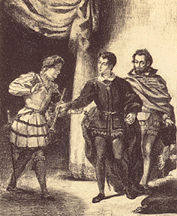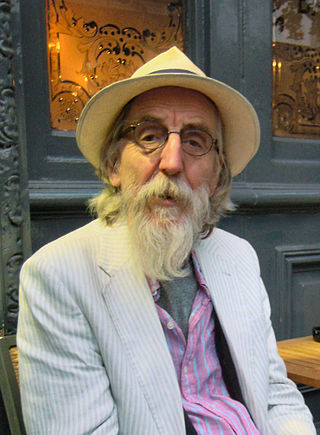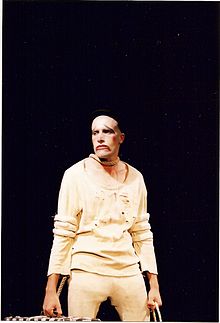
Waiting for Godot is a play by Irish playwright Samuel Beckett in which two characters, Vladimir (Didi) and Estragon (Gogo), engage in a variety of discussions and encounters while awaiting the titular Godot, who never arrives. Waiting for Godot is Beckett's translation of his own original French-language play, En attendant Godot, and is subtitled "a tragicomedy in two acts".

The Theatre of the Absurd is a post–World War II designation for particular plays of absurdist fiction written by a number of primarily European playwrights in the late 1950s. It is also a term for the style of theatre the plays represent. The plays focus largely on ideas of existentialism and express what happens when human existence lacks meaning or purpose and communication breaks down. The structure of the plays is typically a round shape, with the finishing point the same as the starting point. Logical construction and argument give way to irrational and illogical speech and to the ultimate conclusion—silence.
Act Without Words I is a short play by Samuel Beckett. It is a mime, Beckett's first. Like many of Beckett's works, the play was originally written in French, being translated into English by Beckett himself. It was written in 1956 following a request from the dancer Deryk Mendel and first performed on 3 April 1957 at the Royal Court Theatre in London. On that occasion it followed a performance of Endgame. The original music to accompany the performance was written by composer John S. Beckett, Samuel's cousin, who would later collaborate with him on the radio play Words and Music.

Absurdist fiction is a genre of novels, plays, poems, films, or other media that focuses on the experiences of characters in situations where they cannot find any inherent purpose in life, most often represented by ultimately meaningless actions and events that call into question the certainty of existential concepts such as truth or value.

Film is a 1965 short film written by Samuel Beckett, his only screenplay. It was commissioned by Barney Rosset of Grove Press. Writing began on 5 April 1963 with a first draft completed within four days. A second draft was produced by 22 May and a 40-leaf shooting script followed thereafter. It was filmed in New York City in July 1964. Beckett and Alan Schneider originally wanted Charlie Chaplin, Zero Mostel and Jack MacGowran, however they eventually did not get involved. Beckett then suggested Buster Keaton. James Karen, who was to have a small part in the film, also supported having Keaton. The filmed version differs from Beckett's original script but with his approval since he was on set all the time, this being his only visit to the United States, as stated in the script printed in Collected Shorter Plays of Samuel Beckett.
Rough for Theatre II is a short play by Samuel Beckett. "Although this discarded piece of theatre is dated 'circa 1960' in End and Odds, a manuscript from two years earlier exists in Trinity College, Dublin, Library. This situates a first version, written in French [as Fragment de théâtre II] and different from that eventually published in 1976 as between the English plays Krapp's Last Tape and Embers." It is rarely produced.
Matthew Kelly is an English actor and television presenter. Having been trained as a theatre actor, he first came to public prominence as a television sitcom actor, game-show panellist and television presenter of ITV light entertainment shows such as Game for a Laugh, You Bet! and Stars in Their Eyes. In the 2000s he returned to acting, appearing in several West End productions and playing television roles.
Beckett on Film was a project aimed at making film versions of all nineteen of Samuel Beckett's stage plays, with the exception of the early and unperformed Eleutheria. This endeavour was successfully completed, with the first films being shown in 2001.
Endgame, by Samuel Beckett, is an absurdist, tragicomic one-act play about a blind, paralyzed, domineering elderly man, his geriatric parents and his doddering, dithering, harried, servile companion in an abandoned house in a post-apocalyptic wasteland, who mention they are awaiting some unspecified "end" which seems to be the end of their relationship, death, and the end of the actual play itself. Much of the play's content consists of terse, back and forth dialogue between the characters reminiscent of bantering, along with trivial stage actions; the plot is held together by the development of a grotesque story-within-a-story that the character Hamm is relating. An aesthetically profound part of the play is the way the story-within-story and the actual play come to an end at roughly the same time. The play's title refers to chess and frames the characters as acting out a losing battle with each other or their fate.
Estragon is one of the two main characters from Samuel Beckett's Waiting for Godot. His name is the French word for tarragon.
Vladimir is one of the two main characters from Samuel Beckett's Waiting for Godot.

Bernard Wrigley is an English singer, actor and comedian. He is sometimes known by the nickname "The Bolton Bullfrog".

Rosencrantz and Guildenstern are characters in William Shakespeare's tragedy Hamlet. They are childhood friends of Hamlet, summoned by King Claudius to distract the prince from his apparent madness and if possible to ascertain the cause of it. The characters were revived in W. S. Gilbert's satire, Rosencrantz and Guildenstern, and as the alienated heroes of Tom Stoppard's absurdist play, Rosencrantz and Guildenstern Are Dead, which was adapted into a film.
Pozzo is a character from Samuel Beckett's play Waiting for Godot. His name is Italian for "well".

William Mills Irwin is an American actor, clown, and comedian.
Act Without Words II is a short mime play by Samuel Beckett, his second. Like many of Beckett's works, the piece was originally composed in French, then translated into English by Beckett himself. Written in the late 1950s it opened at the Clarendon Press Institute in Oxford and was directed by John McGrath. London premiere was directed by Michael Horovitz and performed at the Institute of Contemporary Arts, on 25 January 1960. The first printing was in New Departures 1, Summer 1959.
Vladimir Estragon were an avant-rock group founded in West Germany in 1988 by German composer and reed player Alfred Harth with FM Einheit, Ulrike Haage, and Phil Minton (UK). In 1980 Harth produced the LP Es herrscht Uhu im Land on JAPO/ECM with the idea of integrating punk rock, free jazz and classical music and followed this design throughout the 80s in the groups Cassiber, Duck and Cover, Gestalt et Jive and Vladimir Estragon.Vladimir Estragon were using electronic arrangements whose preset-derived poetry was poisoned by oblique complexities and sudden animations entering the picture when less expected.

Robert Goody was a British actor, librettist, writer and former member of the Royal Shakespeare Company.
While Waiting for Godot is a web series adaptation of Samuel Beckett’s play En Attendant Godot. It is the winner of Best Cinematography at the 2014 Rome Web Awards, and an Official Selection of the 2014 Miami Web Fest.
Minoru Betsuyaku was one of Japan's most prominent postwar playwrights, novelists, and essayists, associated with the Angura ("underground") theater movement in Japan. He won a name for himself as a writer in the "nonsense" genre and helped lay the foundations of the Japanese "theater of the absurd." His works focused on the aftermath of the war and especially the nuclear holocaust.








